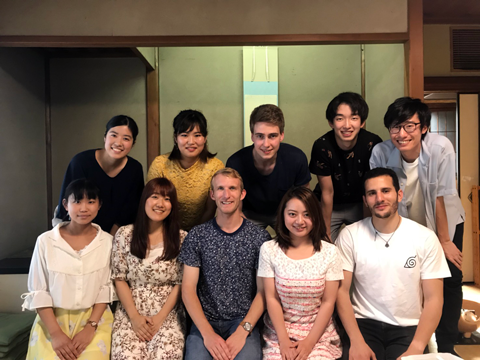国際・国内交流
Dylan Nehrenbergさん(ワシントン大学医学部 第3学年次)
Experience at Hyogo College of Medicine
I had a fantastic time with my clinical experience at Hyogo in the department of Diabetes and Endocrinology. Starting on day one, everyone was warm, welcoming, and friendliy. The first few days I was jet lagged with some sleep depervation, but the students and faculty were thorough in making me feel supported and that I was learning something. By the end of the first week, I felt like I had a good grasp on the day-to-day, and I felt involved with patient care and learning.
From the academic perspective, there were several interesting areas of learning, namely hospital structure, epidemiology, and medical Japanese. Hospital structure was notably different from what I am accostmed to in the United States. There were often six patients to a room, with a dedicated day room on each floor. I noticed several patients taking walks, eating healthful foods, and being supported by the nursing staff. I appreciated the emphasis on maintaining a healthy lifestyle in the hospital, and I felt that this is something I had not seen emphasized in the U.S. On offhand observation, there also seemed to be a larger nursing staff, which I thought worked in favor of patients’ care. Overall, I was impressed with the basic lifestyle emphasis at Hyogo Medical Center. Epidemilogically speaking, I found it interesting how the different population warranted a different diagnostic process. For instance, in the U.S. and adult with diabetes is almost always going to be diagnosed with type II and started on dietary modulation with controller medication. However, in Japan, I noticed most adult new-onset diabetics had Slowly Progressive Type I diabetes—a disease we rarely, if ever, think about in the U.S.. For this reason, antibody tests are commonly done in Japan, but not in the U.S.. I found this change in epidemiology to be quite interesting. Several of the doctors I worked with spoke varying degrees of English, which was helpful in understanding what was happening. For 2 weeks of the rotation, I was placed with a group where English was not often used, and I found this to be very beneficial. This gave me an opportunity to gain Japanese vocabulary useful for communicating to patients and doctors with medical Japanese. This was perhaps the highlight of my learning experience at Hyogo. Doctors were kind and helpful as I learned to talk about the patients we saw in Japanese. In fact, if I were to return, I would like to have as little English as possible!
Socially, the students I met at Hyogo were friendly, welcoming, and made me feel a sense of belonging. We went for food, sight-seeing, karaoke throughout the week, and then extended trips out on weekends. Over the course of my three weeks, I had delicious ramen, saw the beautiful shore of Kobe, made traditional sweets in Kyoto with other students, and ate at one of the best restraunts ever. I trully enjoyed the free time I spent with students at Hyogo, and I will miss them. The medical staff was also increadibly engaging and friendly. I had the opportunity to talk and get to know them over long lunches. With them I had my first omellete rice, tried a curry that was much too spicy, and had great conversations about life in Japan vs. life in America. It was a wonderful way to build a worldly perspective. By the end of my stay, I was sad to leave the department, and when it was joked that I should come back and work when I finish school, I had to give it a second thought.
